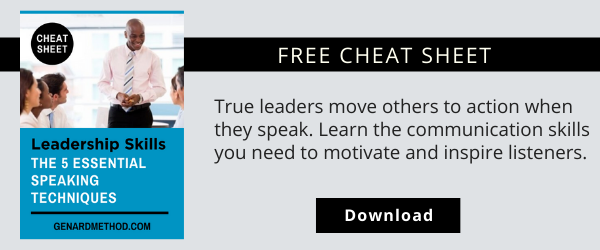What do you need to know to ace an interview? (For maximum presence and focus, download my free cheat sheet, "10 Ways to Stay Fully Focused when Speaking.")
Some of the best advice is well-known, especially for job interviews: do your homework on the company, anticipate key questions, and consider carefully what you can contribute to the organization. But what about skills that can set you apart? And how about other types of interviews that aren't related to employment?
Such interviews don't seem to get much attention. They can include information or "discovery" interviews between a company and potential clients; talks and panel discussions in which your expertise is front-and-center; and media appearances where the stakes can be high.
How can you come across at your best in these forums as you deliver a memorable performance? Below are three easy ways you can do so. These techniques will not only make the interview more successful, it will help you enjoy the process. (To speak more dynamically and engage listeners generally, download my cheat sheet, "5 Ways to Captivate an Audience.")
Body Language and the Matt Townsend Show
Recently, I was the guest for a live radio interview on the Matt Townsend Show, broadcast by Sirius XM on BYU Radio at Brigham Young University. The topic of the show was body language and how understanding it can help in relationships.
Matt is a terrific interviewer who helps make his shows lively and thought-provoking. I not only enjoyed my appearance, but the experience sparked some ideas for this article. I wanted to write on ways you can use in your own interviews to "make a bigger splash" and create interest in your listeners. Here are three of those ways.
3 Easy Ways to Stand Out
1. Be Ready for Curveballs. Good interviewers will ask interesting questions that may come from unexpected directions—and bad interviewers may ask irrelevant ones. In either case, you'd better be prepared to think on your feet (or your seat). Discussing a serious issue in your field? Be ready to respond to a query about your favorite cuisine in the city you live in (that's one I was asked in another radio interview).
Your mind can respond faster than you think it might when you're in a tight interview spot. The key is to give it some training in doing so. One of my favorite techniques is the "one-minute impromptu": Have a colleague or friend ask you questions (from any and all angles, relevant or not). You get one minute to think of how to respond, then you must speak for one minute on that topic. As you get better at this, reduce the thinking time until you make it only five seconds.
2. Use Body Language and Voice Effectively. Interviewees like all speakers too often believe their job is to deliver information. But your job in an interview is really to bring about the response you're looking for in listeners. That will never happen if the mix you offer is heavy on content and light on nonverbal communication. And be sure to avoid the 5 body language errors that will sink your presentation!
Interviews like other forms of oral communication depend upon your ability to enliven what you're saying nonverbally. Your body is a key tool of this type of communication. Learn to give physical expression to your ideas. That means including a gesture or movement that amplifies the important point you're making. Use a mirror or video camera to practice this.
Equally important is using vocal variety to make your voice interesting and compelling. Key among the tools to get this to happen is pitch inflection. The alternative is a mono-tone. If your interview takes place over the phone where visuals are lacking, vocal skills become critically important. Download my "5 Key Tools of Vocal Dynamics" to learn how to use your voice with greater skill and effectiveness.
3. Tell Stories. Another way that listeners become involved and inspired by your content is when you deliver it in terms of a story. This doesn't necessarily mean "storytelling" (though it might). When you speak of matters that are mutually important to you and your listener(s), you are nearly always telling a story. Call it a narrative if you like, but it is always "the story of . . ." whatever it is you are teaching, advocating, or revealing. Stories from your industry, personal anecdotes, others' experiences—all are effective means of making your information come alive.
Use these three skills to reinforce the homework and other forms of preparation you use for your interview. And as always for successful spoken performances, practice out loud so you can hear where you may need to change the language you're using so it resonates with and moves your listeners.




